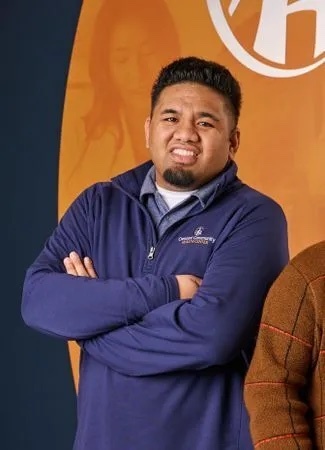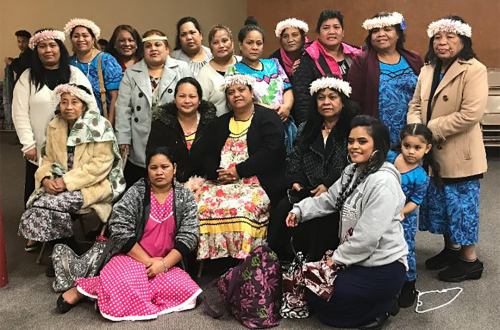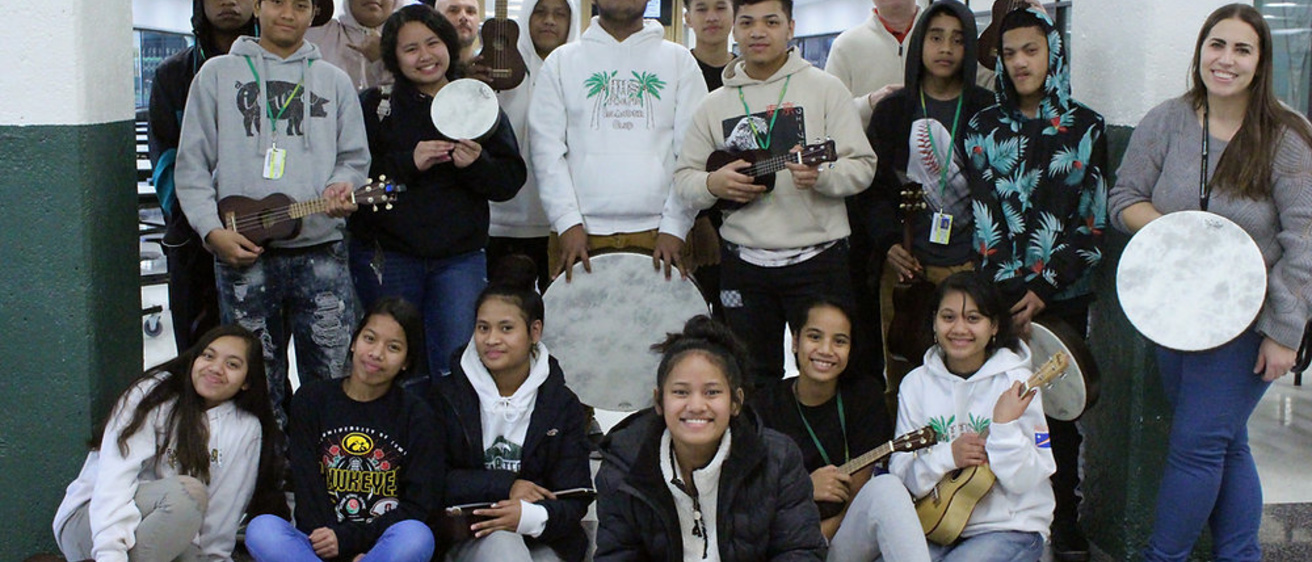In the 1970s, several families from the Marshall Islands moved to Dubuque so that several men could attend seminary school. They liked it enough to stay and encouraged others to join them. Today, there are approximately 1,400 Marshallese in the Dubuque area—the largest population of Marshallese in the Midwest.
Among the challenges faced by this small but growing immigrant community is school attendance. Since the pandemic, truancy has become an increasingly serious and visible problem nationwide, and Dubuque is not alone: more than 30 percent of Dubuque’s K-12 students experience chronic absenteeism. For Pacific Islander students, however, the rate is closer to 78 percent.
We need a game plan

Dustin Alfred, a leader in the Marshallese community, says there have been barriers to school attendance for a long time. “We’ve tried to get better at this,” he acknowledges, “but once we were told that the numbers were this high, we wanted to talk about what changes we could make.” What he and other Marshallese did not want was a drawn-out process.
“This can’t just be brainstorming online,” he says. “We need a game plan to navigate change.”
Which is exactly what three law students from the University of Iowa’s College of Law have brought. As part of IISC’s 2023-24 partnership with the City of Dubuque, students from the Community Empowerment Law Project (CELP) spent the spring semester collecting and synthesizing information and creating a formal structure for action.
Mason Koelm, Parker Ballard, and Fotini Marut have accelerated a project the Community Foundation of Greater Dubuque (CFGD) started early this year. They also brought an outsider’s perspective to the issue, which Alex Baum, Director of Advocacy, Data, and Learning for CFGD says has been a bonus: “They were able to identify who to interview in a way that can be harder to see when you’re in the midst of a system.”
Problem solvers
CELP, directed by College of Law professor Daria Fisher Page, provides legal representation and resources aimed at strengthening communities and advancing social justice. Students in the program often adopt the role of problem solvers, helping to build alliances and amplify under-heard voices. Another CELP team worked in Bondurant this academic year to review the history of the Iowa Reinvestment District Act; they provided analysis regarding funding resources to revitalize former business sites, especially those in the agricultural sector.
While "legal shark" is commonly used to to describe law practice, Koelm, Ballard, and Marut jokingly describe themselves as more akin to “cleaner shrimp.” Each of them joined the CELP out of a desire to combine their legal skills with a sense of dedication toward marginalized communities.

Dubuque’s Marshallese community, which was unknown to the students prior to starting the project, has a unique and challenging set of circumstances. They come from what has been called “by far the most contaminated place in the world,” according to the U.S. Atomic Energy Commission. After WWII, the U.S. government completed nuclear testing in the islands, detonating weapons 7,000 times stronger than those dropped in Japan. Islanders struggle with radiation-related illnesses. Colonization altered their diets, leading to high rates of hypertension and diabetes. And the country—a series of islands and coral atolls—is extremely susceptible to sea-level rise, violent storms, and other issues brought on by climate change.
Collaborating toward belonging
One aspect of the trio’s work in Dubuque has been connecting groups that were unaware of each other or had nominal official ties. Over the course of three and a half months, the group traveled to Dubuque for a dozen in-person visits and participated in two dozen Zoom meetings. Through these meetings, they helped members of the Marshallese community better understand the resources offered by the CFGD and local nonprofits. Baum says the students’ persistence has also helped to formalize processes between the school district and the foundation.
Dubuque has nearly 700 nonprofits, a number that can make it difficult for groups to find each other. Among those with a focus on immigrants, diversity, and/or youth, there is not always clear communication or even awareness of each others' missions. Trying to help these groups collaborate toward addressing complex issues like school attendance is a primary role of the CFGD.
“[Absenteeism] is a broad challenge,” Koelm says. “It’s not just about attendance but about the school environment, systems in place to facilitate attendance; mental health access; cultural competency training; family-to-school communication, and more.”
Through conversations with educators, clergy, healthcare workers, students, and parents, the law school team realized a key factor behind students’ absenteeism is tied to a lack of belonging. Ironically, the Marshallese who have immigrated to the U.S. name access to better education as high on their list of motivators. But if kids, especially adolescents, don’t feel they are part of a school’s fabric, it’s relatively easy for them to find ways to opt out.
Alfred is a key member of the Pacific Islander Health Project with Crescent Community Health Center, an organization central to the puzzle of school attendance. He credits the law students with listening to the community: “They really heard that bullying was a primary issue.”

One way to address this problem is by educating teachers, staff, and other students about the Marshallese culture. “At our first meeting, I pushed for cultural days in our schools,” says Alfred, who moved to Dubuque more than two decades ago and is now raising his family there. “When our culture is shared in the schools, kids feel listened to. We want to teach, together with the community, about who we are and how we fit into this society.”
Expanding notions of "community"
Turning to another U.S.-Marshallese community in northwest Arkansas, the law school team identified a successful cultural competency training program. They've initiated conversations between schools in both locations regarding how to employ it in Dubuque. They are also recommending serious consideration of a program that’s been effective in Austin, TX. Based on the Mexican promotora model, it provides training and payment to community members—in this case, parents--to serve as liaisons.
Baum, Alfred, and others hope the CELP students’ concentrated efforts will help to improve school attendance. The project has already shifted the trio's thinking about their futures. All three soon-to-be attorneys agree the project has expanded their vision of what a legal career can involve, while increasing their interest in working in Iowa.
“It broadened what I understand a community to be,” says Ballard.
“I moved around a lot and didn’t have a very clear feeling of what a community is, so seeing how people work together and rally around those who have a need has changed the way I envision communities and my part in them," Ballard says. "[Because of this project] I feel like I don’t have to go to Chicago or a city; there’s a community right here that is doing work I’m interested in.”
